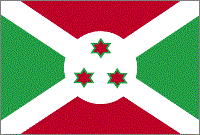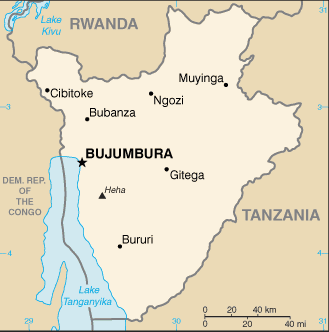Topics Covered
Welcome to Burundi
Overview of Resources
Industrial Minerals
Metals
Fossil Fuels
Investment
Sources
Welcome to Burundi
Burundi, with a total population of 10,557,259 as of July 2012, is located in Central Africa, east of Democratic Republic of the Congo. The country mostly has an equatorial type of climate and covers a total area of 27,830 km2.
 |
The national flag of Burundi.
Image Credit: CIA Factbook. |
In 1993, Burundi witnessed the assassination of its first democratically elected president following which the country struggled through prolonged cultural violence between the Hutu and Tutsi sects. A new constitution was launched in 2005 and the government still faces several economic and political challenges.
Burundi is a country with few resources and with an underdeveloped manufacturing industry. The country’s economy mostly depends on its agricultural sector, with tea and coffee being the country’s chief exports.
The country’s GDP between 2006 and 2011 increased to 4% annually. The country’s economic status stabilized due to increasing financial aid and political stability. The country’s GDP as of 2011 was $5.25 billion.
Overview of Resources
Burundi’s key natural resources include gold, copper, uranium, tungsten, nickel, tin, peat, platinum, limestone, vanadium, tantalum, niobium, kaolin and cobalt.
In 2010, the country’s production of peat, limestone, gold, niobium, tungsten and tin was not of global significance. The production of tantalum accounted for almost 2% of the total world’s production.
In 2009, Burundi’s mining, energy and manufacturing sectors accounted for 11% the country’s GDP. In 2010, the production of peat increased by 16%, tantalum by 173%, niobium by 175%, tungsten by 35% and tin by 50%.
Industrial Minerals
In 2010, the demand for cement in Burundi was about 320,000 t. Cement prices were about $350 per Mt in comparison with that of Tanzania and Kenya where cement cost about $130 per Mt and $120 per Mt. Insufficient production of cement domestically has resulted in increasing costs. The country’s cement prices were also higher than that of Uganda and Rwanda.

The map of Burundi. Image Credit: CIA Factbook
Metals
In 2010, the Muremera nickel project was operated by Australia’s Nyota Minerals Ltd. and towards the end of 2010 the operation of the project was put hold as the company at this point shifted its interest on its Ethiopian projects. Mining licenses for three nickel-cobalt-copper deposits were obtained by UK’s Kermas Group. These deposits include the Waga, the Musongati and the Nyabikere deposits.
In 2010, the resources in these three deposits accounted for the following amounts:
- The Waga deposit had 35 Mt of resources that contained 1.38% nickel.
- The Musongati deposit had almost 185 million Mt that graded 1.31% nickel.
- The Nyabikere deposit had 6 Mt of resources that graded 1.45% nickel.
In 2010, columbite-tantalite was mined at sites in the Kayanza, Ngozi, Kayanza and Kirundo Provinces. Kabarore in Kayanza Province was mined by COMEBU and mining activities in the other provinces were carried out by artisanal miners.
Fossil Fuels
In 2010, peat mining was carried out by ONATOUR at the Gitanga, the Buyongwe, the Matana and the Gisozi deposits. In 2009, the company produced 11,352 t of peat and in 2010 the production increased to 13,111 t. The increasing availability of power supplies and new mining equipment led to this increase in production of peat.
Investment
Burundi has been experiencing a growth in its economic status following the end of the civil war and stability in the country’s political system. To maintain this economic stability, the country will have to continuously rely on foreign aid.
In 2008, the government worked towards drawing more foreign investments in the country’s underdeveloped mining sector in order to increase exploration activities of its mineral resources.
According to experts, Burundi seems to contain a few oil reserves and there are chances of detecting oil resources at the base of Lake Tanganyika. In 2008, many countries carried out exploration activities for copper, gold, cobalt and vanadium deposits in Burundi.
In 2011, the government also decided to reform the country’s mining code aiming to attract more foreign investments. This new mining code eased the procedures to obtain mining license in Burundi and also insisted on the need for a workers association to monitor the activities of the country’s artisanal workers.
Burundi’s mining potential will likely come to light after the successful execution of the governments plans to improve the mining and mineral sectors and attract foreign investments. Besides these progressive plans, experts feel that the government will also have to focus on resolving existing issues such as the country’s poor transportation system, increasing poverty rate and weak legal system.
Disclaimer: The Author of this article does not imply any investment recommendation and some content is speculative in nature. The Author is not affiliated in any way with any companies mentioned and all statistical information is publically available.
Sources
https://www.cia.gov/the-world-factbook/countries/burundi/
http://minerals.usgs.gov/minerals/pubs/country/2010/myb3- 2010-by.pdf
Disclaimer: The views expressed here are those of the author expressed in their private capacity and do not necessarily represent the views of AZoM.com Limited T/A AZoNetwork the owner and operator of this website. This disclaimer forms part of the Terms and conditions of use of this website.